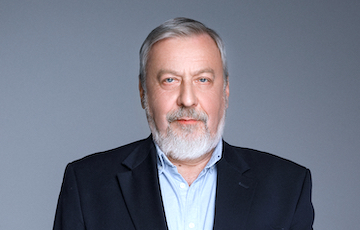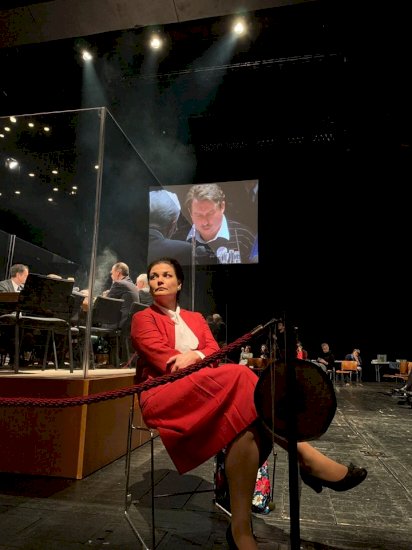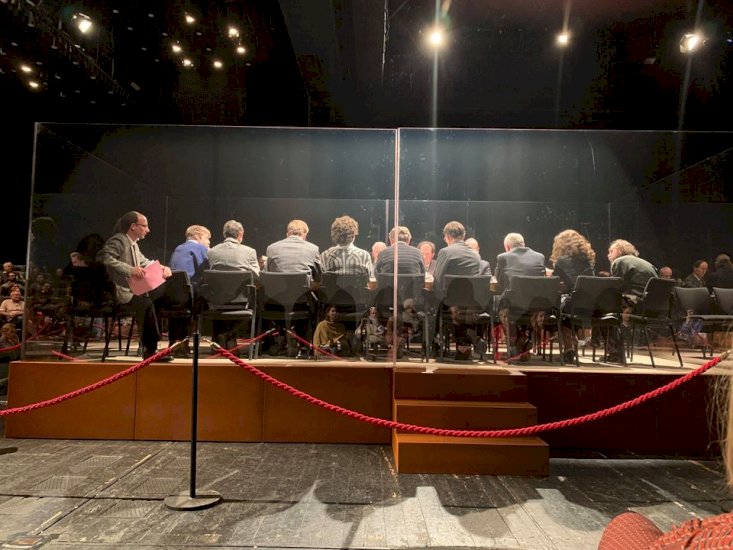Changes Are Inevitable. New Time Has Come
5- Andrei Sannikov
- 4.12.2019, 8:24
- 49,463

PHOTO: YURY DRUH / CHARTER97.ORG
It is curious to look at the events of the “Velvet revolution” in Czechoslovakia from our modern point of view.
Last Sunday, I was lucky to attend a unique event in Prague.
For two days in a row - Saturday and Sunday - the performance “Velvet Simulation: The Cabinet” was given at the National Theater. This is a documentary drama about the negotiations between the authorities and the opposition during the “Velvet revolution”. In fact, this was the “Velvet revolution” itself.
For a long time, the backstage of democratic revolutions in Eastern Europe was hidden from us, but eventually the information about what actually happened has been made declassified.
Bloodless revolutions in the “socialist camp” took place thanks to preliminary negotiations and agreements of the opposition and the communist authorities with the active participation of special services.
We know about the secret negotiations of the leaders of Solidarity with the authorities of the Polish People’s Republic in the town of Magdalenka near Warsaw, but we know less about similar secret meetings in Czechoslovakia.
The negotiations, which were reproduced on the stage of the National Theater, took place in Prague in November-December 1989, and led to the change of power in Czechoslovakia.
The “Bridge Initiative”, represented by musician Michael Koćab and publicist Michal Horáček, acted as a mediator in organizing the meeting between the authorities and the opposition. The first meeting of the representatives of the Czechoslovak government and the ruling Communist Party of Czechoslovakia with the opposition Civil Forum took place on November 26, 1989 (Adameс preliminarily met with students on November 22), and on December 29, power was changed peacefully in Czechoslovakia.
A transcript of these negotiations was published a few years later due to the fact that Vladimír Hanzel, personal secretary of Václav Havel, recorded all these meetings with the dictaphone.
It is curious to look at the events of those years from our point of view.
It was obvious that the Kremlin masters were betraying their former vassals, in this case, Czechoslovak President Gustáv Husák and Communist Party Secretary General Miloš Jakeš, two stubborn functionaries who did not want to recognize the new realities. In this situation, in the communist leadership of the country there were forces that went to negotiations with the opposition. The negotiation group was led by Chairman of the Czechoslovak Socialist Republic, Ladislav Adamec, the “conditional rumas”. At first, he was categorically against the opposition being represented by Václav Havel, but was forced to yield under the circumstances.
Ladislav Adamec really wanted to become president and drag his people into the transitional government. Having begun negotiations, he could not understand that changes are inevitable, that the new time has come. Unable to cope with the negotiations, on December 7 Adamec was forced to resign. Marián Čalfa was appointed to perform his duties, until recently, not even a minister, but an employee of the government apparatus, close to the special services. On December 10, President Husák appointed Čalfa as the Prime Minister, and resigned.
Čalfa was a flexible apparatus man (conditional anyone decent or just more far-sighted), who definitely took time and brought negotiations with the opposition to the end. On December 15, Marián Čalfa initiated a secret meeting with Václav Havel in an office without any tapping equipment. Marián Čalfa invited Havel to work together to promote his presidential candidacy, and promised that he would make sure that the elections were held in accordance with the Constitution. He also advised the appointment of Alexander Dubček as Chairman of the Federal Assembly. Havel and Čalfa agreed to keep the conversation a secret.
On December 29, Václav Havel was unanimously elected president of Czechoslovakia by the Communist Parliament.


Andrei Sannikov, leader of the European Belarus civil campaign, Facebook








